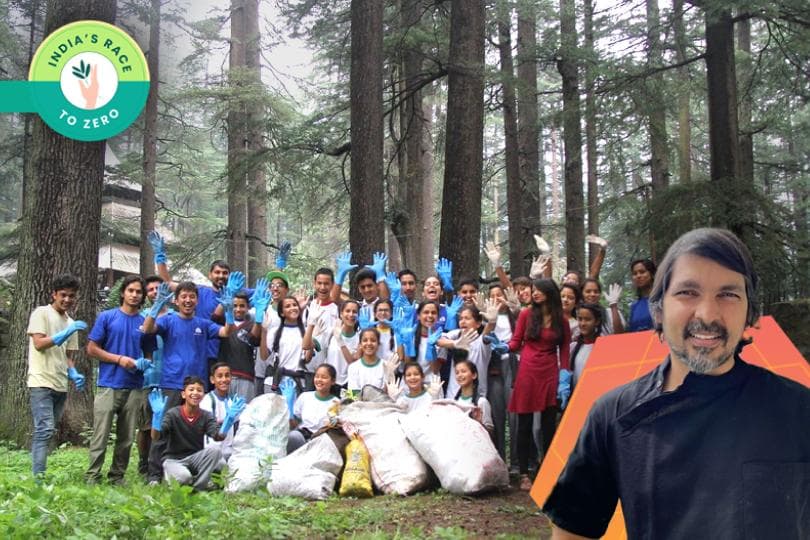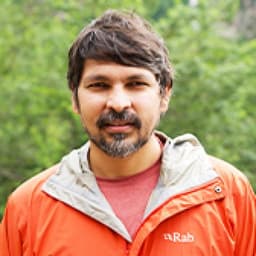Guardians of the Peaks
Healing Himalayas’ Journey Towards Sustainable Tourism in the Himalayan Region.
Pradeep Sangwan

With its rich cultural heritage, diverse landscapes and vibrant communities, India has become a sought-after destination for domestic and international travellers. However, as tourism flourishes, there is a need to embrace sustainability practices to ensure the long-term well-being of the environment and local communities.
The United Nations World Tourism Organisation defines sustainable tourism as an approach that considers the economic, social and environmental impacts of tourism activities while also addressing the needs of visitors, the travel and tourism industry, the environment and host communities. In essence, it seeks to balance the benefits of tourism with the preservation of natural resources and cultural heritage.
India's tourism potential is immense, but so are the challenges it faces in ensuring that growth is sustainable and inclusive. Recognising this, the government has taken significant steps to promote sustainable tourism practices. The National Strategy for Sustainable Tourism, formulated in 2022, aims to mainstream sustainability in the tourism sector and ensure more resilient, inclusive, carbon-neutral and resource-efficient tourism.
However, achieving sustainable tourism goals requires more than just government action. It necessitates collaboration among stakeholders, including government bodies, businesses and local communities. While the government plays a crucial role in policy formulation and implementation, businesses and individuals also have a significant part to play in driving sustainable tourism practices.
In the last decade, tourism in far-flung locations in the Himalayas has increased manifold. Established in 2016, we at Healing Himalayas embarked on a mission to preserve the environment and natural ecology of the Himalayan region. Our journey began with raising awareness among tourists, travellers, trekkers, and locals about the pressing need to protect the Himalayas from waste accumulation resulting from human activities.
Our goal is to establish comprehensive waste management systems that safeguard people, wildlife, and the environment from the harmful effects of plastic and general waste. Volunteers from around the world join us in this vast endeavour, participating in cleanup drives and awareness campaigns for a shared cause. Mountaineers, trekkers, adventure trip operators, and local authorities in the Himalayan region, who share our values, also contribute to these cleanup efforts. Together, we form a large, connected family, maintaining strong bonds until we reunite again. The essence of the Healing Himalayas lies in this ever-growing community of dedicated volunteers.
Healing Himalayas undertakes the cleanup of both popular and less-travelled treks with the help of volunteer trekkers, offering an enriching trekking experience along the way. Our efforts span across various regions including Himachal Pradesh, Haryana, Delhi NCR, Uttarakhand, and Ladakh.
Last year alone, we organised 40 cleaning and plantation drives in diverse locations such as the Kheerganga trek, Prashar Rishi Lake, Shrikhand Mahadev trek, Kinnaur, Spiti, Malana village, Mussoorie, Dehradun, and upper Shimla. Over the past five years, approximately 500 dedicated campaigners have hiked over 10,000 kilometres, collecting more than 800 tonnes of non-biodegradable waste from the Himalayas.
In April 2021, we inaugurated our first material recovery facility in the village of Rakcham (Kinnaur, HP). This facility processes waste from three villages in the Sangla Valley—Chitkul, Rakcham, and Bathseri—as well as from ITBP and Army establishments.
We have successfully inspired several Panchayats to embrace sustainable practices and community-driven environmental initiatives. These include Ratnari-Baaghi and Kotkhai Panchayat in Upper Shimla, Barshaini-Tosh Panchayat, Malana Village in Kullu District, Sissu-Khoksar, Khangsar-Gondla and Udaipur Panchayat in Lahaul & Spiti District, as well as the villages of Rakcham, Pooh, Tabo, Kaza, Mansari, Karjan, Soyal Panchayat, Sethan, and Jhojhu Kalan in Haryana.
In 2021, we initiated an agroforestry project in Charkhi Dadri, Haryana, covering 5 out of 105 acres. This effort aims to increase green cover outside forest areas, enhance soil biodiversity, and boost carbon sequestration.
To tackle waste management challenges, especially in fragile ecosystems, the Healing Himalayas team initiated the establishment of Material Recovery Facilities (MRF) in high-altitude Himalayan regions with the support of local communities and administration. The primary aim of these high-altitude waste collection centres is to promote awareness, knowledge, and practices related to waste minimisation and the use of eco-friendly products.
Implementing MRF centres at such elevations is a pioneering effort, presenting unique challenges. However, with support from Sony Pictures, we successfully established four MRF centres in diverse locations within less than a year. The project began in October 2021, and since then, several MRF centres have been set up and made operational in places such as Rakcham and Mansari villages in Himachal Pradesh.
Moreover, at Healing Himalayas, we have identified locations with substantial tourist footfall in the upper Himalayan region, such as the Atal Tunnel in Lahaul and Spiti, to set up Material Recovery Facilities (MRF) with a storage capacity of 100 tonnes. While streamlining solid waste to MRFs and further recycling is a tedious job, we have achieved a circular supply chain in waste management. We have already set up six MRFs, with three more becoming functional this year.
We are also setting up community centres in two locations this year to host tourists, travellers and volunteers for an experiential tenure. This five to seven-day programme will impart an understanding of how an MRF functions and provide hands-on experience in door-to-door waste collection and segregation. From a cultural point of view, we will introduce visitors to local festivals and weddings, while from an adventure travel perspective, we will offer trekking and camping opportunities.
The Healing Himalayas Foundation has initiated multiple projects to promote ecotourism in the pristine Himalayan landscape. Some of the noteworthy endeavours include the Rakcham MRF, Swarnim Himalay, Sustaining Paradise, and Project Satyug.
Rakcham MRF:
The Healing Himalayas Foundation embarked on an innovative journey by establishing the first Material Recovery Facility (MRF) in Rakcham, strategically located just 10 km before Chitkul, the gateway village to our border region. Completed in mid-2021, this facility signifies a significant leap towards sustainable waste management, aiming to transform the area into a litter-free community by eliminating open-air solid waste burning. It underscores our dedication to resource conservation, minimising environmental impact, and promoting eco-friendly tourism.
स्वर्णिम हिमालय (Swarnim Himalaya):
The स्वर्णिम हिमालय (Swarnim Himalaya) Summit addressed the pressing challenges of solid waste management (SWM) and proposed practical solutions. Designating June 25, 2023, as a major clean-up day for the Himalayan region, stakeholders were urged to rally communities, raise awareness, and drive behavioural change. This campaign aims to cultivate zero-waste communities, engaging individuals, NGOs, government bodies, institutions, and businesses, emphasising collective responsibility through zero-waste, zero-budget initiatives, and decentralisation.
Sustaining Paradise:
Sustaining Paradise, the flagship project of the Healing Himalayas Foundation is dedicated to preserving the natural heritage of the Himalayas. The surge in tourism has resulted in substantial pollution of air, water, and soil, with non-biodegradable materials clogging valleys and streams, choking water systems, and polluting soil, exacerbated by waste burning that contributes to air pollution. To counter this, the project aims to establish a sustainable local waste management cycle, advocating for the creation of waste collection and processing centres with community backing. Workshops, training sessions, and cleanup drives are planned to empower communities in safe waste disposal practices, ultimately reducing the carbon footprint and preserving the environment.
Project Satyug:
Healing Himalayas’ flagship initiative, “Project Satyug,” endeavours to conserve Haryana’s natural beauty by safeguarding the environment and fostering a circular economy. This initiative entails constructing a waste collection centre in Village Jhojhu Kalan, Haryana, to segregate and recycle local landfill and village waste. This sustainable waste management system will mitigate hazardous gas emissions from waste burning, preserving the region’s environment, wildlife, and biodiversity. Recycling processes will repurpose or upcycle waste, diminishing the necessity for fresh resource extraction and benefiting the environment. Aligned with eight United Nations Sustainable Development Goals, Project Satyug impacts local communities by enhancing livelihoods through efficient waste recycling. It aspires to self-sustainability, empowering the local community and government to generate revenue, supporting daily lives, and fostering environmental preservation, agriculture, and local tourism development in Haryana.
Way Ahead:
Our efforts at the Healing Himalayas Foundation, alongside various stakeholders and communities, reflect our significant commitment to preserving the Himalayan region's natural beauty and ecological balance. Furthermore, individual travellers can make a difference by adopting responsible travel habits. This includes researching and planning trips responsibly, choosing eco-friendly transportation options, respecting local cultures, and supporting local artisans and businesses. Businesses operating in the tourism sector can contribute to sustainability efforts by adopting eco-friendly practices, collaborating with local communities to create economic opportunities and supporting conservation initiatives.
